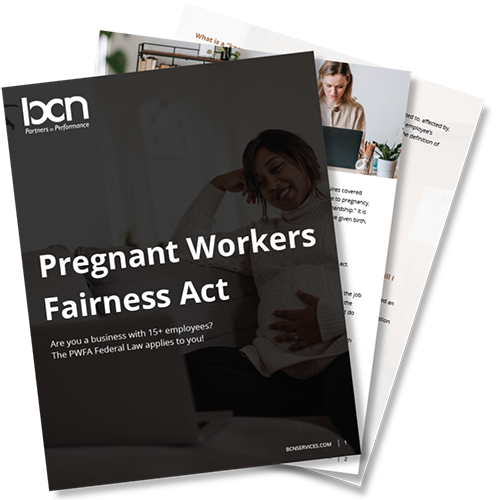Pregnant Workers Fairness Act
Are you a business with 15+ employees? This applies to you.







What is the PWFA?
The Pregnant Workers Fairness Act (PWFA) is a recently passed Federal law (EEOC) that requires covered employers (15+ employees) to make “reasonable accommodations” for known limitations due to pregnancy, childbirth, or related medical condition(s) unless doing so would cause the employer “undue hardship.” It is against the law to terminate someone or treat them differently because they are pregnant, have given birth, or have a related medical condition.

Are you looking for guidance on the PWFA and have 15+ employees?
"*" indicates required fields


Is Your Organization In Compliance?
Take a look below at a few critical components of the new Pregnant Workers Fairness Act ( PWFA).
When will the EEOC begin to accept charges under the PWFA?
The EEOC will begin accepting charges under the PWFA on June 27th, 2023. For the PWFA to apply, the situation alleged in the charge must have occurred on or after June 27th, 2023. A pregnant worker who requires an accommodation before June 27th may be entitled to one under another federal or state law.


Who is protected by the PWFA?
The PWFA protects workers and applicants of “covered employers” who understand they cannot accomplish specific tasks due to pregnancy, childbirth, or other related medical conditions. The PWFA applies to an employee, regardless of their length of service or hours worked.
What does “reasonable accommodation” mean?
The definition in the bill comes straight from the Americans with Disabilities Act. Under the ADA, reasonable accommodations are modifications or adjustments that enable a person to do the core parts of their job. Changes to the work environment or how things are typically accomplished are examples of “reasonable accommodations”.


PUMP ACT & ADA
Both the PUMP Act and ADA are important Federal Laws to review when considering the Pregnant Workers Fairness Act. Take a look below at what organizations need to consider to ensure they comply with each.
The links above will take you out to the Department of Labor (dol.gov) and the Americans With Disabilities Act (ADA.gov) page.

Pregnant Workers Fairness Act
Are you looking for guidance on the PWFA and have 15+ employees?
We have created an educational resource to help! Check out our eBook: Pregnant Workers Fairness Act. This resource provides guidance for organizations with 15+ employees and outlines critical components of the new PWFA.

Frequent questions
If your company employs at least 15 workers, you must comply with the protections outlined in the act.
A reasonable accommodation is any change to the application or hiring process, to the job, to the way the job is done, or the work environment that allows a pregnant worker who is qualified for the job to perform the essential functions of that job and enjoy equal employment opportunities. This is limited to changes that do not incur an “undue hardship” for the business.
Managers should use the interactive process to determine a reasonable accommodation; this requires both management and the employee to engage in a discussion about what the limitations are and how the work could be adapted in consideration of these limitations.
According to the act: “the term ‘known limitation’ means physical or mental condition related to, affected by, or arising out of pregnancy, childbirth, or related medical conditions that the employee or employee’s representative has communicated to the employer whether or not such condition meets the definition of disability specified in section 3 of the Americans with Disabilities Act”
Examples of known limitations of pregnancy include (but are not limited to)
- Frequent healthcare appointments
- More frequent use of the bathroom
- Dietary restrictions, including the need for more calories and water
- Reduced range of motion
- Reduced capacity for strenuous activity
- Shortness of breath
- Nausea and vomiting, particularly during early pregnancy
- Fatigue
- Joint pain
- Child birth; incapacitated for 6-12 weeks with only relatively predictable start date
Not necessarily. You need to begin the interactive process and engage in discussion with them about the limitations there are experiencing and how the work could be adapted in consideration of those limitations.
For example: a pregnant worker’s normal job duty requires standing on their feet for the duration of their shift. The employee requests a transfer to another role that does not require standing.
In the interactive process, you may find a reasonable accommodation that allows the employee to remain seated at their currently assigned position or to take more frequent breaks.
We do not recommend asking if an employee is pregnant. Focus on whether or not they have requested an accommodation. If you are unsure, say “Are you requesting an accommodation?” Employees are not required to use those words in order for us to recognize their request for accommodation. So, this question will help to clarify their intent. If an employee has not indicated a need for accommodation, it is not necessary to furnish them outside of the interactive process.
Answer the question while protecting the employee’s confidentiality.
“While considering what is fair for everyone, we do look and treat employees individually and make considerations based upon good business reasons which allows for privacy of each individual.”
No. A reasonable accommodation should not create “undue hardship” on the employer. Inconveniences are not equivalent to undue hardship.
